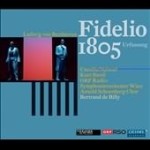As most opera lovers know, Beethoven toiled greatly over his sole opera which was premiered in 1805 and revised in 1806–and then finally again in 1814, in the version that is now famous and beloved. The recording under consideration here is of the first version; this is the third time it has been recorded commercially. (The first was in 1976 under Herbert Blomstedt; the second is led by John Eliot Gardiner and was released in 1997; a live performance from the Bregenz Festival in 1960 also is available. I have heard only the Gardiner.) Beethoven was of course right to continue working on the opera and was encouraged by friends to do so, but hearing his original thoughts is fascinating.
One opening caveat regarding this performance is in order. The opera, as composed, contained lengthy scenes of dialogue; they have been replaced here by spoken additions from a 1985 book by Walter Jens called Rocco’s Erzahlung (Rocco’s Story), a monologue that tells the story from Rocco’s viewpoint. These passages are read by actor Martin Schwab. In truth, there are only 12 minutes of these interruptions, but they break up the music and are of course in German (leaving most of us in the dark). Ruefully Oehms does not even supply translations–the libretto is in German only. I suspect I would like the texts just as little if they were in English, but there’s always the remote control, and each spoken section has its own track. (Gardiner’s performance also has a narrator who interrupts more often but more briefly; but there is an English libretto.)
The opera, as we know, was a flop in 1805. Not only was the work a problem, but save for a bunch of Napoleon’s soldiers and some stalwart opera-goers, the Theater an der Wien was mostly empty for its three performances. Listening to this version, however, is an ear-opener: much music was eventually used in the familiar 1814 version, but even within those many pages there are small alterations everywhere and they’re great fun to spot.
The first act has no action; it is 45 minutes of exposition, with the familiar set pieces for Marzelline, Jaquino, Rocco, and “Mir ist so wunderbar”, each altered in several ways. In place of the rugged, very military march we know from the 1814 version, there’s a light, easygoing march at the start of the second act (there are three acts) that immediately precedes Pizarro’s entrance; after the “Jetzt, Alter” duet for Rocco and Pizarro, instead of launching immediately into “Abscheulisher” (a marvelous coup de théâtre), Leonore and Marzelline sing an extended, charming duet about marriage (I followed the libretto from the Gardiner recording), with obbligato violin that holds up the action and sounds as if it comes from another opera.
Leonore’s gran scena follows, shorn of its recitative, with the vocal line somewhat higher and some bizarre coloratura that is graceless and out of character. Act 2 ends with the prisoners, et al, but also includes a noisy interruption from Pizarro and is missing the wonderful, layered “Leb’ wohl, du warmes Sonnenlicht”. Florestan’s aria is less dramatic than in 1814, and while “Er sterbe” still packs a wallop (and is written higher for Leonore), at its conclusion Rocco takes Leonore’s pistol and goes after the escaping Pizarro, thereby leaving a few minutes for the re-united couple to chat about their reunion before launching into a longer, busier, more complicatedly written but less effective and manic “O namenlose Freude”. The finale is somewhat longer and not as effective, but still exciting.
The performance is excellent, indeed marginally better than the Gardiner. It’s as tightly led in exciting passages but Bertrand de Billy also captures some rapturous stillness and warmth in “Mir ist so wunderbar” and elsewhere, while Gardiner seems a bit clinical. De Billy also has slightly better singers. Camilla Nyland’s sound is grander than Hillevi Martinpelto, and her reading of the text is deeper; Kim Begley and Kurt Streit are vocally both fine, but Streit’s sweetness and goodness make a better case for Florestan. Peter Rose’s understated Rocco is never mugged, and while I prefer a heavier voice than Gerd Gochowski’s as Pizarro, his ease with the vocal line is a pleasure to hear. Dietmar Kerschbaum’s Jaquino never cloys and Brigitte Geller’s Marzelline is beautifully sung. De Billy gets thrilling playing from the Vienna Radio Symphony–the scoring in this version of the opera is very horn-heavy and generally heftier than the 1814–and I have a preference for ORF’s non-period instruments here. The Arnold Schoenberg Choir sings with accuracy and feeling. All Fidelio and Beethoven fans will need this.
































